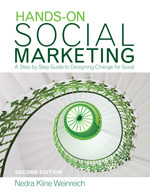
Rather than rehash what others have already said, both pro and con, in response to the BuyLessCrap.org campaign (tagline: “Shopping is not a solution. Buy (Less). Give More.”), I’ll just add what I have not seen being said yet.
As someone who is a pretty minimal consumer, this approach resonates with me. Do we really need to promote consumerism as the solution to what is essentially a political problem? While I can see both sides to the issue, I have always been somewhat uncomfortable with using a cause marketing approach to issues that can be better addressed with a social marketing or political advocacy approach – i.e., issues that require individual or social change.
From a nonprofit’s point of view, of course, the opportunity to raise funds through cause marketing partnerships makes a lot of sense. However, looking from a wider lens, many issues are not going to be solved just by throwing more money at them. AIDS and poverty in Africa are entangled with issues of political dictatorship and endemic corruption.
One common praise of the (RED) campaign is that, even if it only donates a fraction of the money spent to promote it, at least it raises awareness of the issue. But how many people do not already know that AIDS is a problem in Africa? And what good is that awareness if it does not lead to some sort of action?
I wrote about this with optimism back in October, but at this point, it’s clear that this campaign has missed a huge opportunity to turn awareness into action by not leveraging its connection to Bono’s ONE campaign, which does address political and social change. The (RED) campaign could be so easily and effectively tied into a social movement that starts with the purchase of a branded product, but does not end there. Regardless of the actual size of the pool of money flowing in as a result of the campaign, the larger focus should be on growing the pool of people adding their voices for change and giving them a way to express themselves. Social media tools could be used in innovative ways and Bono’s involvement provides exciting opportunities to tie music into the campaign as well.
If they start to think big, beyond a single purchase of a product, the results could be inc(RED)ible. Otherwise, I’m afraid the campaign is (LESS) than inspiring.
Technorati Tags: red, buylesscrap, one, bono, campaign, nonprofit, cause marketing

 Nedra helps nonprofits and public agencies create positive change on health and social issues through social marketing and transmedia storytelling strategies at Weinreich Communications since founding the company in 1995. She helps organizations make a difference for the populations they serve by strategically designing programs that draw on state-of-the-art behavior change techniques, digital media approaches and the power of stories.
Nedra helps nonprofits and public agencies create positive change on health and social issues through social marketing and transmedia storytelling strategies at Weinreich Communications since founding the company in 1995. She helps organizations make a difference for the populations they serve by strategically designing programs that draw on state-of-the-art behavior change techniques, digital media approaches and the power of stories. 
Great post and great overlooked point. Where was the cultivation of these folks? Smart cause marketers will keep this in mind.
Dear Nedra, thanks for your great post and the previous optimistic one. ). I am still a student at the University of Oregon and interested in nonprofit organizations’ development.Here are just my two cents. After reading your posts, I really appreciate your thoughts on both sides of issues around (RED). However, I still hold my optimistic view toward RED campaign. Setting the awareness issues beside, I think the RED campaign at lease provide instant and visible help to the global fund. As you said, RED is helping the global fund to “distribute anti-retroviral medicine to people who would not be getting it otherwise.” RED is solving a problem in a much more practical way. ONE campaign is definitely a great one as it truly informs the public of the causes of poverty. The goal of ONE campaign is kind of “lofty” (which is used on its own website) and needs comparatively long term to measure its success. Both RED and ONE are very important to the cause in Africa. Therefore, I think RED offers sustainable resources for the Global Fund to fight against ADIS in Africa. Probably RED needs to add more new elements to their campaign as you suggested, like education programs about how to help more besides buying the RED branded products.
na,
I think you’re right that we are rushing to judgment too soon on whether the campaign is successful or not — it was only launched about five months ago. It’s too early to write RED off yet.
Wow, this is a spectacular post. You really raise some great points that I personally would never have considered. More specifically, I thought it was interesting how you pointed out the fact that people are willing to fall back on the notion that by wearing the shirts they’re raising awareness if nothing else. Like you said though, at this point, who doesn’t know about AIDs in Africa? However, I would like to make it known that I do appreaciate and applaud the (RED) campaign. It’s just, like you, I think there could still be more thought and time put into the overall mission that it has.